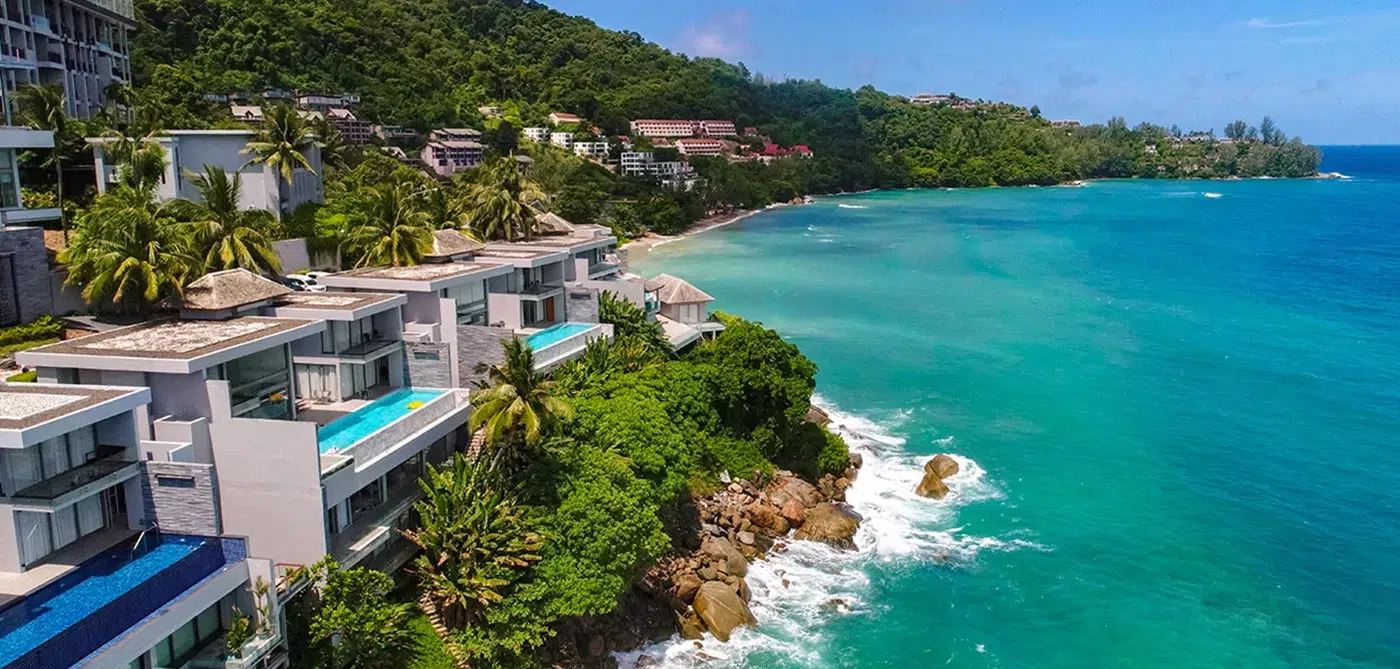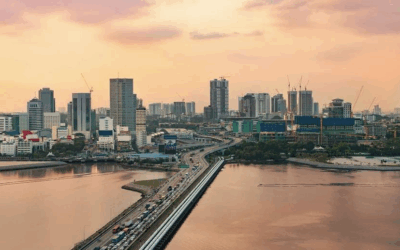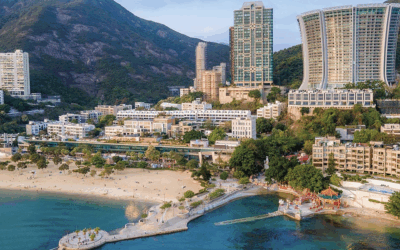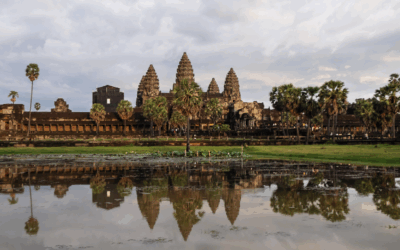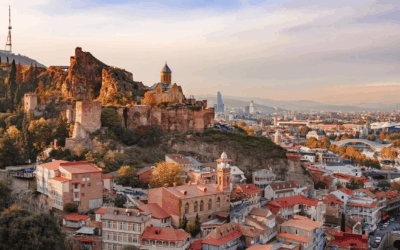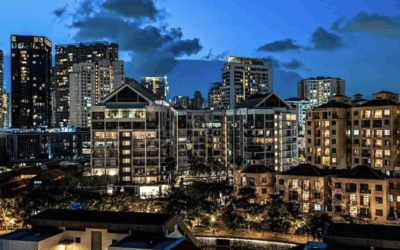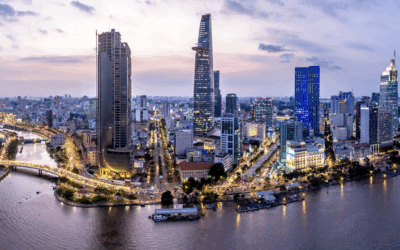Thailand has long been a popular choice for retirees, digital nomads, and plenty of other foreigners seeking to begin a new life abroad.
By some metrics, Thailand is home to a greater number of expats than anywhere else in Asia. The expat community in Thailand has grown to approximately two million foreigners and will only increase from there in 2025.
The majority of foreign citizens living in Thailand are from nearby countries like Myanmar, Laos, and Cambodia while others – seeking to escape the stresses of life elsewhere – arrive from all over the world.
In recent years, the growth of the digital nomad movement has also led to an increase in expats working remotely and choosing to live in Thailand for its affordable cost of living, warm climate, and attractive lifestyle.
Several new visa options, including the ten-year LTR (long-term residence) visa, have made living in Thailand as a foreigner much more convenient. Especially if you can afford to invest here.
No doubt, Thailand is an attractive destination for expats of all types from around the world. If you are considering visiting or moving to Thailand, this guide is for you.
We’ll first cover what it’s like to live in Thailand as an expat, how to adapt to the lifestyle, and what cultural differences to expect.
Afterwards, we’ll discuss the most popular cities in Thailand for expats and compare all the paths to getting a visa that will allow you to live here long-term.
How is Expat Life in Thailand?
Perhaps the best part of living in Thailand is the flexibility it offers. It seems almost cliche to praise somewhere for how “flexible” it is, but Thailand offers it in droves.
Do you want to eat at street stalls and spend $3 on food every day? Sure, you can do that.
On the opposite end of the spectrum though, Thailand has over 20 different Michelin star restaurants where you can eat imported food and spend $300 per person.
Whether you want to live on a remote beach or one of the world’s largest urban areas… whether you want stay at the Waldorf Astoria or a cheap hostel… whether you want to order McDonalds or Pad Thai at 3AM in the morning, you can do it in Thailand.
Naturally, Thailand is welcoming to families, retirees, backpackers, and multimillionaires alike, if you know where to look.
Thailand’s Cost of Living
Generally, Thailand has a lower living cost than many Western countries. The cost of living can vary widely depending on your lifestyle and location.
A general rule is that local food, transport, and healthcare are affordable, while Western-style goods and services can be more expensive. You’ll pay more to eat German food or buy an imported car here than in your home country.
Major cities like Bangkok and islands like Samui and Phuket are also more expensive. Smaller towns and rural areas are generally cheaper.
Housing and Rentals in Thailand
Of course, Thailand is home to 70 million people, and not everyone lives in an urban area. You’ll find many small towns and villages across the country. If you’re renting a hut out in the middle of nowhere, it’ll significantly reduce your living expenses.
If we’re talking about places where expats live, though, living in Pattaya and Chiang Mai is considerably cheaper than living in Thailand’s capital city or popular island destinations like Phuket.
Finding accommodation in Thailand depends on your budget and where you want to live. The country has no shortage of choices regarding rentals, and you can find almost anything from basic apartments to luxurious houses.
Rental prices are usually and generally cheaper outside of major cities and can be more expensive in popular tourist areas. It’s essential to research the location and condition of the property before committing to a rental agreement.
We have a guide covering the risks of buying property in Thailand if you’re interested in the country’s real estate market.
Getting Around in Thailand
Thailand has a developed transportation system includes buses, trains, taxis, tuk-tuks, and motorbikes. Domestic plane flights are also available in most major cities up north, northeastern, and south.
Public transport is generally cheap. For example, even in Bangkok, driving from one end of the city to the other shouldn’t cost more than a few hundred baht.
Bangkok’s BTS Skytrain is highly efficient. Combined with the MRT subway, buses, airport rail link, and other methods of transport, you can access many parts of the city without needing a car.
Driving in Thailand can be challenging, and many expats rely on public transportation or hire a driver.
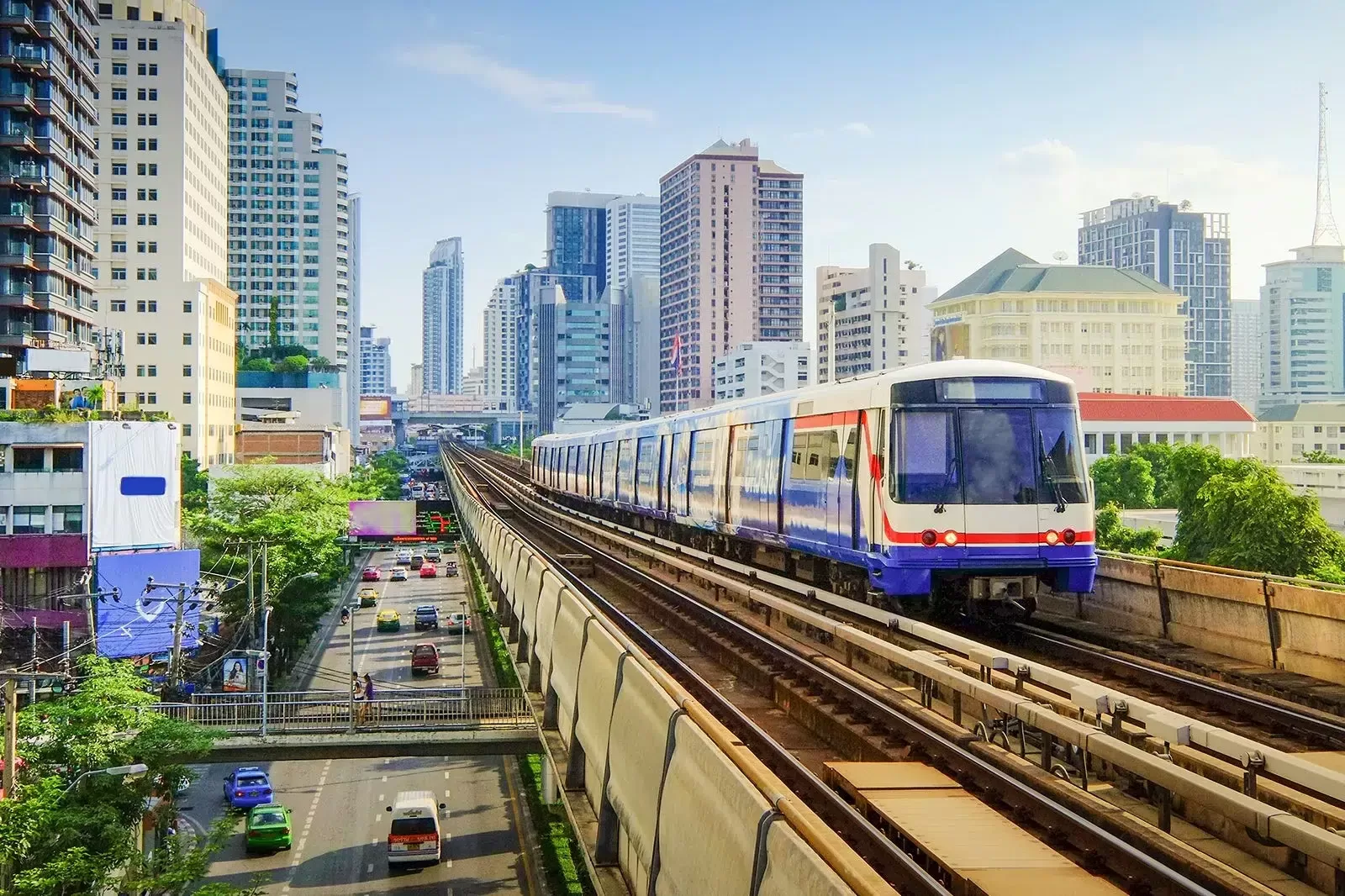
The BTS Skytrain system has over 65 stations and is still expanding. Plus, with an additional subway and bus line, it’s not even the only mass transit system in Bangkok
Safety in Thailand
Thailand is generally a safe country for expats to live in. On average, Bangkok or Chiang Mai is safer than most large US and European cities.
The violent crime rate in Thailand is low. Pickpocketing and scams in Thailand do happen, but you’re unlikely to get mugged or attacked in broad daylight.
Following the simple rule of “don’t talk to random people” who rush up to you on the street will also help you avoid 90% of petty crime.
Like any country, though, some areas are safer than others. Expats should take precautions to avoid areas with high crime rates. Don’t go wandering down dark alleys in Khlong Toei at night.
Healthcare in Thailand
Thailand’s private healthcare system has gained a reputation as one of the best in the world due to its high-quality services, modern facilities, and affordable prices.
The country has become a hub for medical tourism, attracting patients from around the world who travel to receive high-quality medical treatment at a fraction of the cost they would pay in their home countries.
Elites from several nearby countries, especially Cambodia and Vietnam, also come to Thailand for better-quality services.
Private hospitals in Thailand are equipped with the latest medical technology and staffed by highly trained doctors and medical professionals, many of whom have trained in the US or Europe.
English is also widely spoken in these leading hospitals, making it easy for foreigners to communicate with doctors and nurses. Many even have an international patient care unit with staff who can speak Arabic, Chinese, Japanese, and other widely-spoken languages.
In addition to providing top-quality medical treatment, Thailand’s private hospitals offer various other services, including wellness programs, health screenings, and cosmetic surgery.
Many private hospitals in Thailand have affiliations with international medical providers, allowing for seamless continuity of care for patients who require treatment in different countries.
Despite the high quality of private healthcare in Thailand, it remains affordable compared to many other countries, particularly in the West. This has made it an attractive option for expats and medical tourists seeking top-quality medical treatment at a reasonable price.
Education in Thailand
Private and international schools are usually expensive but generally offer a higher quality of education. On the other hand, public schools are free, but the quality of education is variable.
The demand for expat English teachers has increased in recent years as Thailand seeks to improve its English language skills to compete in the global economy.
Thailand’s best schools in higher education are Chulalongkorn University, Mahidol University, and Thammasat University.
Opening a Thai Bank Account
Expats can open bank accounts in Thailand with their passports and proof of residency. Some banks may require additional documentation, such as a work permit or visa.
Your options as a tourist, on the other hand, are minimal. Even though it’s still possible, in some circumstances, to open a Thai bank account as a non-resident, like if you have a referral letter from an existing customer or another reason to be in Thailand.
Researching your banking options and fees is essential, as some banks may charge higher fees for foreign account holders.
You may be interested in our full guide that covers banking in Thailand as a foreigner if you’d like to set up an account here.
How to Get a Driver License in Thailand
Expats can drive in Thailand with an international driver’s license, but getting a Thai driver’s license is recommended if you plan to drive regularly.
The process for obtaining a Thai driver’s license can vary depending on the applicant’s home country license and experience.
Phone and Internet Services
Phone and internet services are widely available in Thailand. Two major players in the industry are True and AIS, both offering competitive rates for local and international calls and data.
SIM cards and phones can be purchased at most convenience stores and phone shops, and internet service can be installed at home or accessed through public hotspots.
Adapting to Thai Culture
Preparing for the cultural differences you will encounter in any country is integral to being an expat. Doing so helps decrease cultural shock and increase your ability to connect with and respect the locals and their culture.
So, what must you understand about Thai culture and customs before you go?
Here are a few things to keep in mind:
- Thai culture strongly emphasizes respect, especially towards elders and those in positions of authority. The famous “Wai” gesture, which is a gesture used in greetings and giving thanks, is also done in a fashion that the younger person must initiate to pay respect to elders.
- Personal space is smaller in Thailand, and physical contact, such as a handshake or a pat on the back, is common. However, if you are conversing with elders or someone in a higher position than you, it’s customary to let the elders initiate such physical contact with you first.
- Buddhism is the dominant religion in Thailand, influencing many aspects of daily life. However, Thailand is one of the most culturally flexible societies in the world, and it’s extremely common to find a Thai Buddhist who also practices some Hinduism and celebrates Christmas!
- The concept of “saving face” is crucial in Thai culture, which means avoiding public embarrassment or causing others to lose face.
- Thais are generally non-confrontational; they can be indirect in communication and may not say “no” directly to avoid offending anyone, so paying attention to nonverbal cues is essential.
Learning the Language
- While many Thais speak English, learning some basic Thai can go a long way in building relationships and navigating daily life.
- Some useful phrases to learn include greetings, asking for directions, ordering food, and expressing gratitude.
Daily Life in Thailand
- Thailand can be hot and humid, so dress appropriately for the climate.
- Many businesses close during the afternoon for a few hours during “siesta” time.
- Tipping is not expected in Thailand; many upscale restaurants will readily include a 10% Service Charge, but rounding up the bill is still appreciated.
Socializing and Making Friends in Thailand
- Thais are generally friendly and welcoming, but it may take time to build deeper relationships.
- Participating in local events or joining clubs based on shared interests can be an excellent way to meet people.
- Learning about Thai holidays and customs and participating can show respect and help build connections.
What is the Work Culture Like in Thailand?
- The concept of “saving face” is also vital in the workplace, so criticism should be given privately and diplomatically.
- The hierarchy in Thai businesses is more pronounced, and respect for superiors is expected.
- Maintaining good personal relationships with colleagues and business partners is beneficial.
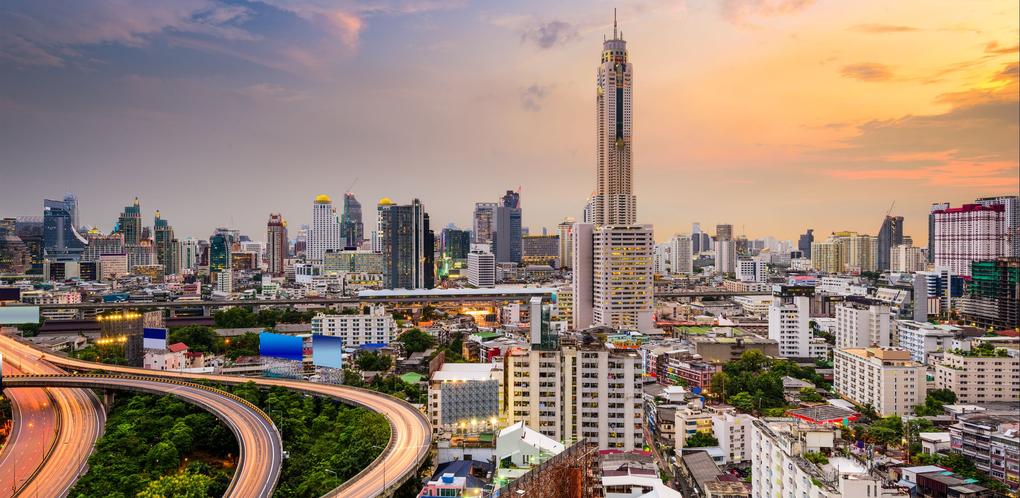
If you’re employed by a multinational firm and being sent to Thailand as an expat, it’s very likely that you’ll be sent to Bangkok. You probably won’t be working on a beach.
The Best Cities in Thailand for Expats
You can read the full report on how to invest in the places below in our guide on how to invest in Thai property.
For now, here are several highlights of ten major cities in Thailand. Several of these are popular among expats while others are considered off-the-radar.
Bangkok
Bangkok is the capital city of Thailand. With over 15 million people living in its metro area, it offers enough entertainment and dining options to spend a lifetime exploring and never see it all.
There’s no official count, but estimates say about 300,000 expats call Bangkok home. You probably won’t find a more extensive expat community elsewhere in Asia.
Pattaya
Pattaya is a beach resort city known for vibrant nightlife and affordable property prices compared to Bangkok and Phuket.
With a mid-size population of about 2 million, Pattaya is relatively easy to settle into as a newcomer. Jomtien Beach and its surroundings are also part of the Pattaya metro area.
Phuket
Phuket is an island province famous for its stunning beaches, crystal-clear waters, and laid-back lifestyle. It has a large expat community, particularly in Kathu, Rawai, and Chalong, where many expats own businesses and properties.
Chiang Mai
Chiang Mai is a major province located up north, known for its rich history, beautiful temples, and peaceful way of life.
Over the years, Chiang Mai has especially become popular among retirees and digital nomads, who enjoy the city’s affordable cost of living and relaxed atmosphere.
Hua Hin
Roughly a 3-hour drive southwest of Bangkok, Hua Hin is a seaside resort town popular among expats for its peaceful lifestyle, white-sand beaches, and high-quality golf courses.
Hua Hin is also home to many retirees, who appreciate the town’s slow pace of life and affordable cost of living. The royal family maintains a residence near the city.
You don’t have as many options living in Hua Hin as in Pattaya, and it’s slightly further away from Bangkok. Hua Hin’s residents would tell you that superior beaches and a quieter atmosphere make up for it.
Koh Samui
Koh Samui is a tropical island known for its stunning beaches, crystal-clear waters, and lush greenery.
While it’s less hectic than Pattaya or even Phuket, Koh Samui remains a popular choice for expats looking for a relaxed way of life away from the hustle and bustle of the city.
Krabi
Krabi is a province in the south, neighboring Phuket. Famous for its stunning coastline and crystal-clear waters, Krabi is a popular destination for expats who enjoy outdoor activities such as rock climbing, hiking, and kayaking.
Khon Kaen
Khon Kaen is an unofficial capital city in the northeastern region. Known for its friendly locals, traditional food, and affordable cost of living, Khon Kaen is also home to expats who work in the education and healthcare sectors.
Nonthaburi
Nonthaburi is located just northwestern of Bangkok and is among the most populated provinces in Thailand.
Often considered an extension of Bangkok, Nonthaburi is often chosen by expats with a lower budget who want to live near Bangkok but not in it.
The province is also near hundreds of large factories, both local and multinational, and may be convenient for those employed in the industrial/logistics sectors.
Udon Thani
Udon Thani is another province in northeastern known for its friendly locals, affordable cost of living, and vibrant nightlife. It is home to many expats who work in the education and healthcare sectors and is a popular destination for retirees.
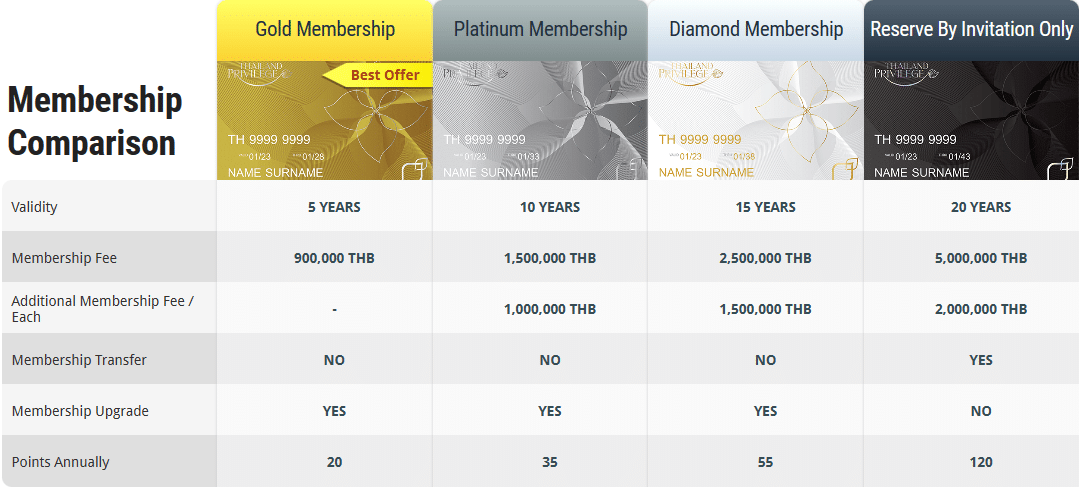
A chart showing the differences between the four Thai Elite Visa packages.
Types of Visas in Thailand
If you have already visited Thailand and decided it’s a place you want to call home, you will need a long-term visa to remain in the country beyond the lifespan of your typical tourist visa.
The Thai Elite Visa and the Long-Term Resident (LTR) Visa are the two most popular visa programs. Both require substantial investments, so you will want to be sure Thailand is the right fit for you before jumping in and getting one of these visas.
Thai Elite Visa
The Thai Elite Visa is a special visa available to foreigners looking to stay in Thailand long-term.
To qualify for the Thai Elite Visa, a lump sum payment in exchange for this non-renewable visa that lasts between 5 and 20 years. The lump sum payment varies depending on your chosen package, with prices ranging from THB 900,000 to 5 million (approximately $25,000-$140,000).
Four packages are available, with the highest package available through invitation only. Each package comes with its benefits and services.
These Thai Elite Visa packages vary widely in terms of price and duration. Generally, they offer a range of benefits, such as visa extensions, airport services, and concierge services.
You can include family members in your Thai Elite Visa package with additional fees. The fees depend on the package you choose and the number of family members you wish to include.
Some other things to know about the Thai Elite Visa include:
- You Can’t Get a Work Permit: The Thai Elite Visa doesn’t provide a work permit, so you must obtain a separate work permit if you wish to work in Thailand.
- No Annual Fees: Once you have paid the lump sum fee for the Thai Elite Visa, there are no annual fees or other charges to maintain the visa.
- Limited Availability: The Thai Elite Visa is limited to a certain number of applicants each year, and terms have been known to change, so it’s essential to apply early if you’re set on obtaining the visa.
Overall, the Thai Elite Visa is a good option for foreigners looking to stay in Thailand long-term and who want to avoid the hassle of renewing their visa every year.
While it does require a significant upfront payment, the benefits and services of the visa can make Thailand’s Elite Visa a worthwhile investment for those who plan to stay in Thailand for an extended period.
Thailand’s Long-Term Resident (LTR) Visa
The LTR Visa is another type of visa that is available to foreigners who wish to stay in Thailand long-term. The visa has a validity of 10 years, which is longer than most other visas available to foreigners.
Unlike the Thai Elite Visa, the LTR Visa is renewable once it expires. This means that you can continue to stay in Thailand after your initial 10-year visa has expired as long as you meet the requirements for renewal.
To be eligible for the LTR Visa, you must meet certain income and asset requirements depending on your chosen route. There are three main routes you can take:
- The Investment Route: requires the applicant to invest a minimum of THB 10 million (approximately $300,000) in a Thai company or government bond. The investment must be held for at least three years.
- The Employment Route: requires the applicant to have a work permit and be employed in Thailand for at least three consecutive years. The applicant must also have paid income tax in Thailand during this time.
- The Income and Asset Route: This route requires the applicant to have a minimum annual income of at least $80,000 and a minimum net worth of $1 million. A Thai embassy or consulate must verify the income and assets.
In addition to meeting the income and asset requirements, you must also meet other eligibility criteria to qualify for the LTR Visa. This includes having a valid non-immigrant visa, being a resident of Thailand for at least three consecutive years, and having no criminal record.
The LTR Visa provides several benefits to foreigners looking to stay in Thailand long-term. For example, it allows you to stay in the country for up to 10 years without applying for a new visa or extending your current one.
LTR Visas also allow you to apply for a work permit, making it easier to work and do business in Thailand.
The application process for the LTR Visa can be complex and time-consuming, as many documents and requirements must be met.
It’s important to work with an immigration lawyer or consultant to ensure you have the necessary paperwork and meet all the eligibility criteria.
Overall, the LTR Visa is a good option for foreigners looking to stay in Thailand long-term and meet their income and asset requirements.
Conclusion: Is Moving to Thailand a Good Idea?
Thailand offers a unique blend of modern comforts and cultural experiences, making it an attractive destination for expats looking to explore a new part of the world and create a new life.
From its world-class private healthcare system to its delicious cuisine, there is something for everyone in Thailand. However, living here long-term is not for everyone.
Be sure to give Thailand a “test run” of sorts and stay for a few months at a time before committing to it long-term.
Living abroad as a full-time resident is a vastly different experience compared to merely visiting as a tourist. You’ll probably feel differently about a place after having spent years there.
While adjusting to life in Thailand may present some challenges for expats, the friendly locals and open attitude towards foreigners can make the transition smoother.
FAQs: Living in Thailand
Why Should I Move to Thailand?
Thailand is a favorite among expats due to its affordable cost of living, warm climate, and diverse lifestyle options. Whether you prefer bustling urban centers like Bangkok, serene beaches, or quiet rural areas, Thailand offers something for everyone.
The country is also welcoming to a variety of expats, including retirees, digital nomads, and families, making it an attractive choice for those seeking a new home abroad.
What Types of Visas are Available in Thailand?
Thailand offers several visa options for expats, including tourist visas, retirement visas, and long-term residence visas like the Thai Elite Visa and the Long-Term Resident (LTR) Visa.
Each visa type has its own requirements, so it’s essential to research which one best suits your needs before applying
What's the Cost of Living in Thailand?
Thailand generally has a lower cost of living compared to many Western countries. You can live comfortably on a modest budget by dining at local street stalls or opt for a more luxurious lifestyle with high-end restaurants and accommodations.
Keep in mind though, if you're constantly eating western food and living an international lifestyle Thailand can be as expensive or moreso than in your home country.
What Are the Problems with Living in Thailand?
While Thailand is a welcoming country, expats may face challenges such as language barriers and cultural differences. Adapting to the local way of life, including understanding Thai customs and etiquette, can take time.
Visa requirements and finding suitable long-term housing can alson be complex for newcomers. Yet with patience and preparation, most expats find the transition manageable.

